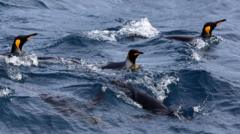In a surprising turn of events, US Commerce Secretary Howard Lutnick has recently justified new tariffs applied to the Heard and McDonald Islands, a remote Australian territory populated only by penguins and seals. The tariffs, intended to close perceived "ridiculous loopholes," aim to prevent foreign countries from using the islands as transit points when shipping goods to the United States. Lutnick explained to CBS that leaving territories off the tariff list could lead other nations to exploit these islands for trade advantages.
US Tariffs on Uninhabited Islands Spark Controversy and Confusion

US Tariffs on Uninhabited Islands Spark Controversy and Confusion
The US government's decision to impose tariffs on the remote Heard and McDonald Islands, home only to wildlife, has raised eyebrows internationally.
In Australia, the response to the announcement has been one of disbelief, with Trade Minister Don Farrell deeming it a "clearly a mistake" and suggesting that the tariffs were implemented hastily. The situation has drawn attention not only due to the unique nature of the islands but also because of its connection to broader trade practices impacting the US economy. Following the tariff news, the US stock market experienced a steep decline, the worst since 2020, with all major index dropping sharply.
As part of the defense of these tariffs, Lutnick referenced public policy insights from the Pew Charitable Trusts, which claim transshipment routes can enable illegal activities, obscuring shipping data for commodities like tuna in the Pacific. Despite the confusion surrounding the islands' trade significance, World Bank data indicates minimal exports to the US, totaling $1.4 million in 2022, almost exclusively from unspecified machinery and electrical products.
Interestingly, the British Indian Ocean territory, noted for its military presence and restricted access, was also included in the tariff list, having reported approximately $414,350 in exports to the US last year. As these developments unfold, the implications and motives of imposing tariffs on such remote locations remain under scrutiny, raising questions about the administration's broader trade strategies.
As part of the defense of these tariffs, Lutnick referenced public policy insights from the Pew Charitable Trusts, which claim transshipment routes can enable illegal activities, obscuring shipping data for commodities like tuna in the Pacific. Despite the confusion surrounding the islands' trade significance, World Bank data indicates minimal exports to the US, totaling $1.4 million in 2022, almost exclusively from unspecified machinery and electrical products.
Interestingly, the British Indian Ocean territory, noted for its military presence and restricted access, was also included in the tariff list, having reported approximately $414,350 in exports to the US last year. As these developments unfold, the implications and motives of imposing tariffs on such remote locations remain under scrutiny, raising questions about the administration's broader trade strategies.





















